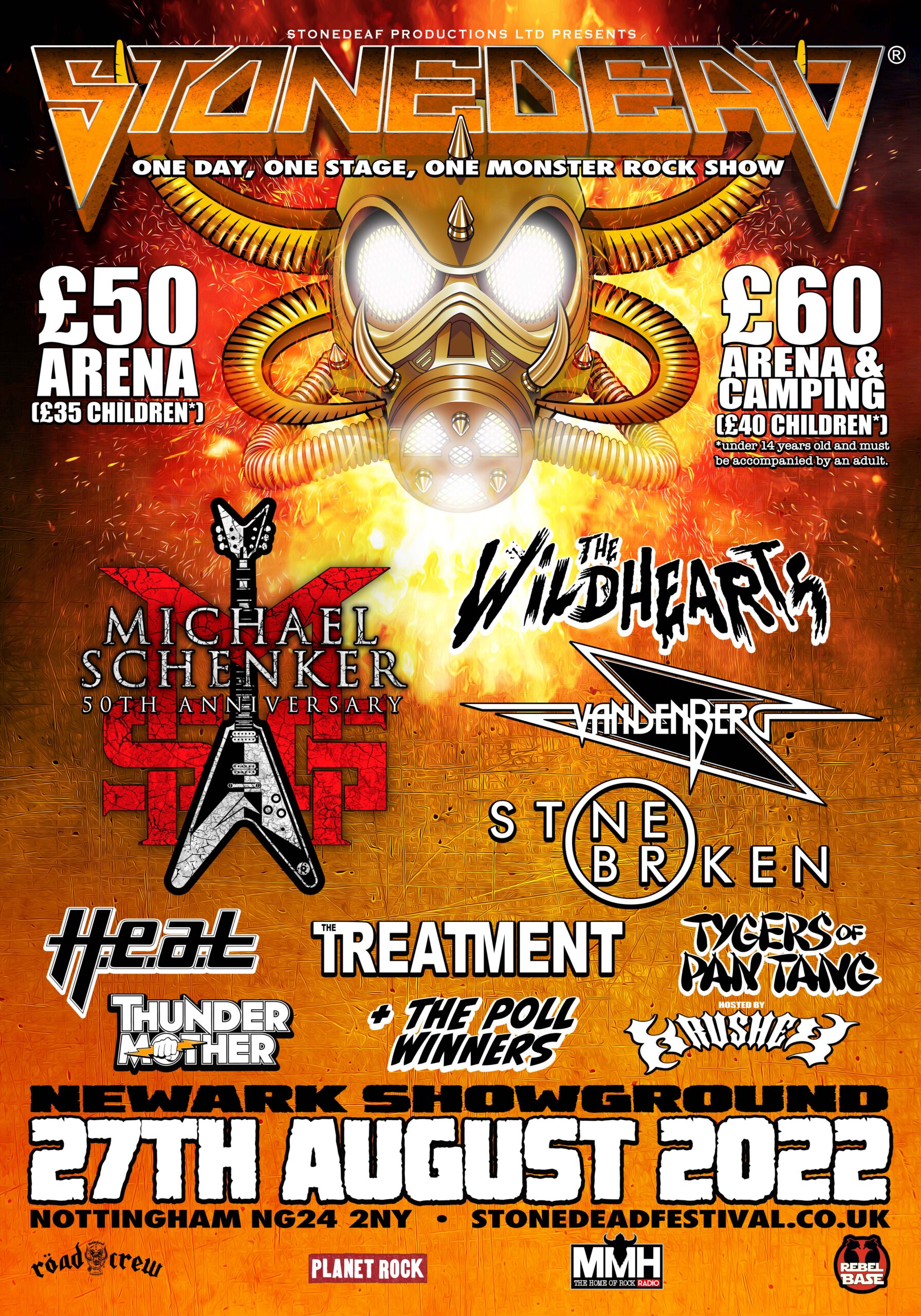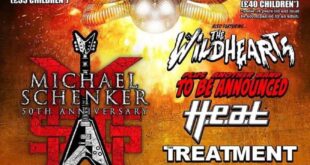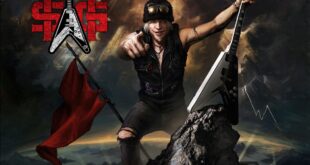I spoke to German guitar legend Michael Schenker ahead of the release of the new album from his Michael Schenker’s Temple of Rock project – Bridge the Gap, due for release in the UK on the 2nd of December.
 Your new album, Bridge the gap is due for release in the UK at the beginning of December. When did you start writing for the album?
Your new album, Bridge the gap is due for release in the UK at the beginning of December. When did you start writing for the album?
I started writing in October 2012 as we finished the first leg of our European tour. The European tour had gone so well we consistently had new offers coming in, so we extended the tour with a second leg which wasn’t going to start till April 2013, so I took the opportunity of using the six months break usefully and to make an album with this lineup, so I started writing in October and by the end of the year I was ready to give Doogie material and also I went into the studio, making arrangements and putting down stuff, and when I gave Doogie the material, to explain I said to him I knew the album title before I started writing, Bridge the gap, so I said to Doogie “Think ‘Bridge the gap’ and think melodic”. He went away and did an excellent job and by the end of the year in the studio I started arranging and we put down the drums, and hired a special studio for that, and then did the bass and Wayne’s guitar, then Doogie was ready to demonstrate his ideas. Michael Voss and I sat down with him and we started to put down the vocals, and by the end of March we had finished the main part of the album. On the first we had our first concert in Russia and we toured the second leg of the tour until somewhere around July/August. Then we went back in the studio and listened to the album again after five months completely staying away from it – I kind of locked the tape up and people were pissed off about it, but it was a very unusual situation to be there with an album for all these months basically done, finished in March and not going to be released in December. I’ve not had a situation like that before, but the good thing that came out of that was that many artists after an album is released say “Oh I wish I could have done that”, or “I wish I’d done that differently”, so we had a great opportunity, it wasn’t planned but that’s what came out of it – to go back, listen to it with fresh ears and do some fine tuning. So we added some stuff to it, we mixed it, remastered it and got that much closer to better.
Was it frustrating to record the album and then have to wait months before people get to hear it?
Of course, but that’s an unusual situation and I didn’t like it, but as I said, the good thing was we had the opportunity to go back and improve it. When you’re in a studio for months you lose all perspective maybe and you sometimes miss stuff, so by staying away for a few months and listening to it with fresh ears it was a very interesting situation being able to make these changes and we were able collectively to get a better result.
How do you write – for example do you start with an idea for a song or a guitar riff?
Always between one album and the next album I’m constantly playing and discovering, and when I bump into new riffs and when I find something I like I put it down on a Walkman cassette recorder – usually five or ten second pieces, like a little riff, and I just keep collecting. Then when it’s time to make a new album I listen from the beginning to what I’ve collected, and whatever inspires me and hits me straight away, I get inspired to write extra bits to go with it, then I give my stuff to the singer, in this case to Doogie, and he does his lyrics and melodies, and then step by step it’s continuous studio and arranging you know – making an album that sounds balanced end to end and has enough interesting mix of emotions, and a healthy balance between fast, heavy, hard, melodic, dramatic, mysterious, darkness here and there – it’s all about balance. If I ever listen to music, my own music, I hear it from the beginning to the end, like a book, you know that always stays on a certain level of excitement.
When you started writing did you have a definite plan for what you wanted the album to sound like?
Yes. When Doogie did the first tour and Pete Way wasn’t so well, I asked Herman about Francis – because we were playing so many Scorpions songs, it would be great to have Francis involved, and he was more than happy to do that, and when he actually came and we started to rehearse together, it was like “Wow, the last thing we did together in the studio was ‘Lovedrive’, and here we are again together”. It went so well that I thought we must make a DVD before something happens, and it got stronger and stronger and after that I decided we had to do an album together, so “Bridge the gap” was basically Herman, Francis and myself – we’ve been out of the loop for a long time based on various different reasons, but the last album we made together was Lovedrive and here we are again making a new record. I hope this is us bridging the gap from Lovedrive to the new album, so that’s where Bridge the gap comes from. We’re using a bit more 7 strings and adding that lower heaviness to it, keeping it a bit more modern to try and improve as much as possible.
On the last album you had a number of singers and guest musicians, but this time you’ve stuck with one lineup. Did that change how you approached things?
It will make a difference because this lineup has developed more any more into a solid touring and now recording band, and so we’re using Michael Schenker as a platform. For the next album I want everyone to be together in a rehearsal studio together and start writing together, with someone introducing a riff and then everyone putting something to it, so to experience that, which I’ve done a few times with UFO in the early days, to see that will be great as the chemistry is very good. That’s what I’m driving for, for the future, so we’re using Michael Schenker’s Temple of Rock as a platform to create this lineup and build it’s own identity in the future. To look for good manaagement who can handle it, because my representatives and myself, I cannot manage and do this, so we need to develop a self-sufficient unit with everything around it, so right now we’re using what I set up for myself to do this, and we are in the making, bridging the gap to it’s own identity.
With such a long career covering UFO, The Scorpions, Michael Schenker Group and all your other work, you have a huge amount of songs to choose from when putting together a concert setlist. How difficult is it to decide what to include?
Well it was actually very easy the first time around because I looked at “Strangers in the night”, “Live at the Budokan”, “Lovedrive”, stuff that was most representative of Michael Schenker’s involvement, and then I did another tour and changed the set around, and fortunately I have got many songs that I can swap around in order to create new set lists and still play some stuff that people will prefer over other songs, and I would say it would be getting harder after a few world tours because I’m consistently writing and recording new songs, and now with a fun lineup that looks like everybody wants to be there and it’s creating a very stable environment and with the album it looks like there is really good material coming together that we can mix with the “best of” stuff and create a healthy and balanced type of live set that includes new material and stuff we haven’t played for a while.
You’ve got a Japanese tour in March next year I believe?
Yes we are starting a promotion tour in the US in January making sure people know about the new album, and the first concerts will be in Japan. As we speak we’re putting together a world tour that will continue after Japan in Europe, the UK and after that the American tour.
You’re often quoted as an influence by guitarists. Are there any guitarists out there who you like to listen to?
Well I have stopped listening to music since I was seventeen, I made a conscious effort. I’m more interested in pure self-expression and I knew intuitively that it would be better to stay away from listening to music since it creates grooves and influences. I’ve done that since an early start so I only really know about what has influenced and inspired me – people like Jeff Beck, Leslie West, Jimmy Page, Rory Gallagher, Eric Clapton – all the great guitarists from the late 60s, so there’s only a few that I was really aware of, and really blown away by. There was Yngwie Malmsteen, quite sensational guitar playing – it was so different and so fast, it was overwhelming. I was amazed at first that something like that was possible. The other guitarist was Eddie Van Halen – I was very impressed by his first album, that was really really something. So those are the couple that I kind of couldnt ignore. I know there’s a lot of good stuff out there but I wouldn’t be able to pinpoint who is doing what or what I like about it and so on.
When you’re not writing, recording or touring, what do you like to do to relax?
Well, Sleep. You know, I’m a very creative person, and that’s what relaxes me and makes me happy. I’m not a competitive person, I don’t compete and create that kind of stress, so peace of mind is the theme of my life. I’ve got two tattoos on the back of my shoulder, one says “Born to be free” and the other is “Born to overcome”. I’m a very spiritual person and I express freely without wondering how well I do – just being myself, so it gives me a lot of freedom and therefore not much stress in my life.
Thank you very much for your time
Thank you.
Michael Schenker’s new album “Bridge the gap” will be released on 2nd December
 PlanetMosh Keeping it Metal
PlanetMosh Keeping it Metal


